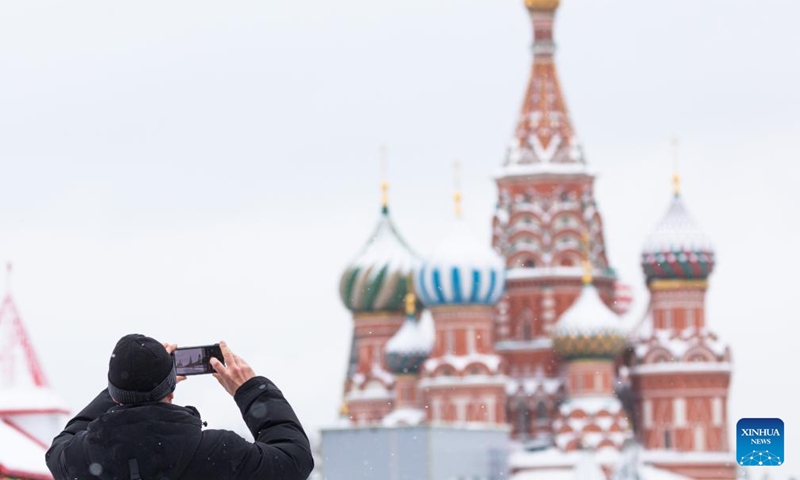
A man takes a photo in the Red Square in Moscow, Russia, on Jan. 26, 2022.Photo:Xinhua
Click here to stay tuned with our live updates on Ukraine tensions. Recent sanctions applied to Russia are already bringing tremendous economic suffering to average Russians. Countries have blocked Russian planes from their airspace, the EU has outright banned Russian media outlets and some European countries have stopped issuing visas to Russian nationals.
The most extreme cases are in Central and Eastern European (CEE) countries that have historical ties with Russia, and were former Warsaw Pact members. Where I live in the Czech Republic, it is now a jailable offense to make statements of public support for Russia's operation.
This exposes these countries exercising Russophobia over supposed liberal democratic values. Since the narrative is that these countries broke from the Eastern bloc to gain these values in the first place, it begs the question of whether these values truly are a core part of their national identity, or if hostility toward Russia is.
I think this is a fair question because of the sheer amount of outright discrimination that has been normalized in civil society and by the government.
We have seen people like hall of fame Czech hockey player Dominik Hasek make their Russophobia clear. He recently called for the outright ban of Russians from the US National Hockey League - regardless of their stance on the war. To him, a person's passport determines their culpability for their government's actions.
We have also seen professors refuse to teach Russian students and witnessed a growing number of incidents across the board. Almost every Russian friend I have here has told me about a physical threat they've received recently.
For example, one friend who has lived here for several years was harassed and even received a physical threat from a male classmate because somehow the war is her fault at a personal level for being a Russian national. Another friend at this same university told me that her professor refused to begin class until every Russian student left the room.
We can also see that a brutal black and white war narrative is being imposed on people. As a journalist, my job is to contextualize things. Part of contextualizing the conflict of Ukraine includes noting that every single important scholar on this subject has warned that NATO's expansion into Ukraine would result in conflict.
I have received a barrage of harassment and death threats just for saying this and have had to call the police in recent days over some credible threats. I also appeared on Peter Lavelle's CrossTalk on RT this week and had to be aware that if I spoke out of line, I could be sent to jail. All of this is pretty disturbing in a liberal democracy in the EU.
There are certainly other countries that are seeing the same things. I happen to know about the situation here from a first-hand perspective. All of this goes far beyond punitive measures against the Russian state and is a wholesale war against the Russian people.
But this kind of behavior is dangerous. It's dangerous for normal people who live in these countries and have nothing to do with the decisions made by the Russian government. It's also dangerous because it leads to the amplification of radical actions.
This behavior erodes civil rights and democracy in these countries in obvious ways by creating clear contradictions through exceptionalism. We see NATO exceptionalism where the bloc's actions in the past are forgotten or whitewashed while Russia's actions are characterized by its capacity to "commit evil."
In countries like the Czech Republic, it would be no exaggeration to say that if the standard of jailing people for supporting an illegal military operation was applied fairly, virtually every major Czech politician in the country's modern history would be in prison right now for supporting, or being a party to, NATO and America's offensive wars.
It feels like Europe has learned nothing from its long bouts with nationalism and that we could be heading for a more dangerous outcome if these nationalistic tempers aren't cooled.
The author is a Prague-based American journalist, columnist and political commentator. opinion@globaltimes.com.cn




